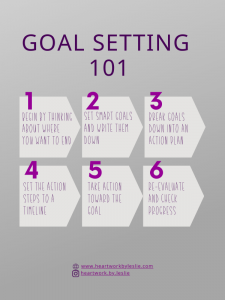This post may contain affiliate links, which means we may receive a commission, at no extra cost to you, if you make a purchase through a link. Please see our full disclosure on the Affiliate Disclosure Page.

It’s December. We all know that. However, have you realized (I’m sure you have) that January is next month? That means that a lot of people will be setting goals and may need help figuring out how to do that.
What is a Goal?
Let’s start with something really simple, the definition of a goal.
A goal (my definition based on several sources) is something a person is trying to achieve, an aim or desired result of an action, and/or the object of a person’s efforts or ambitions.
Goals keep us accountable even if we do not achieve them, especially if we share them.
Examples of Goals
 We have all set goals. Just in case you aren’t sure what you want to do for your new goals, here are some examples.
We have all set goals. Just in case you aren’t sure what you want to do for your new goals, here are some examples.
–save a specific amount of money for vacation, car, school, or retirement
–become a better listener
–take a walk every day
–buy a home or car
–become a better writer or reader
–begin taking classes for a new career
–start a new hobby
–spend a specific number of hours a week with your family
How to Set Goals
Think Backwards
As a teacher, I always hated hearing this. Plan backward; know where you want to end and start there. I never understood what I was being asked to do until I attended a goal setting training. When it was explained to me in terms of goals, then I was able to understand and do my lesson planning “backward.”
The first thing to do towards setting goals is to decide what you want the desired outcome to be.
Once you know that, you can work backward through the rest of the steps of setting goals and make a plan.
Set SMART Goals
You have probably heard of these. SMART goals are specific, measurable, achievable, relevant, and time bound.
Specific
Making a goal specific reminds you when you look at it exactly what you are trying to achieve.
Measurable
A measurable goal uses the specifics above and gives you a way to quantify if you have attained the goal or not.
Achievable
Setting a goal that is impossible sets you up for failure. However, if you set a goal that you know you can reach, it makes you more likely to strive for it.
Relevant
Having a relevant goal means that you have a specific reason or purpose for wanting to achieve it. You know the reasoning behind the goal and you are motivated to reach it.
Time-Bound
Without a time limit, you aren’t setting a goal. You are simply dreaming about something that could happen one day or never. Putting a specific (there’s that word again) time on when the can (or should) be completed is what qualifies it as a goal instead of a dream or wish.
Write Your Goals Down
 Have you ever told yourself, I want to drink more water, or I want to lose weight? Did you accomplish it?
Have you ever told yourself, I want to drink more water, or I want to lose weight? Did you accomplish it?
I will guess that you probably did not achieve what you wanted to do.
We have all done it. We tell ourselves we want to do something, but we never actually set the goal to get it accomplished.
Now, when you are setting your new goals, write them down. Be sure to write a starting and anticipated ending date with the goal.
During this step, let your supporters (friends and family) know your goals. They can help you stay accountable if you want that from them.
Create an Action Plan
Now that you know what goals you want to achieve and have them written down, you can break them into smaller parts.
This will help you to make the timeline for the next step. Once you know the goal, the date, and the steps needed, you can set up the plan.
Make a Timeline
Now, you are ready to create a timeline for your goals.
 If you are like me, you will want a calendar or planner for this, but start on a sheet of paper.
If you are like me, you will want a calendar or planner for this, but start on a sheet of paper.
This is an important step in setting goals.
To begin, take out a piece of paper, lined paper may work best for this.
Then, write the goal with dates at the top of the page. Include the beginning and proposed ending date. You can label them if you’d like.
Next, write out each of the steps to the action plan you created in the previous step. Each step in the goal should be written on its own line.
Write the starting date for the goal beside the first step. Figure out, realistically, how long that step should take to complete.
Write the day after that completion date on the line beside the second step. Then continue this with each step.
Once you have all the dates written by each step, grab your calendar and write in the timeline there. If you use Google calendar or a digital planner, put the dates on there and set reminders.
You can also set milestone reminders, maybe weekly, just so you can track your own progress.
Take Action
You have set a goal, a plan, and a timeline.
Now, it’s up to you to take action.
Do what you need to so that you can achieve the goals you have set for yourself, your family, or your business.
This may not seem like part of setting goals, but it is. If you aren’t willing to take the actions needed, there is no need to set that goal.
Re-evaluate and Re-assess Your Progress
As I mentioned during the timeline step, you can set a reminder on your phone or calendar to check progress.
If you have a goal that is going to take a few weeks or more to complete, set reminders. Check in with yourself to see where you are in the timeline.
If you need to add more time, you can. If you are ahead of schedule, that’s amazing. Know where you are so that you can keep making progress toward the goal.
Celebrate
 I have learned that I work better if I set rewards for myself as well. If I have a goal to save a certain amount of money, for example, when I save a quarter of it, I do something for myself.
I have learned that I work better if I set rewards for myself as well. If I have a goal to save a certain amount of money, for example, when I save a quarter of it, I do something for myself.
I could take a day to walk around the mall. My reward could be that I grab a drink from Starbucks. Maybe I will take a day to rest and read a book. However, I reward myself along the way.
Each time I reach another milestone, halfway or three-quarters through, I reward myself.
When I complete the goal entirely, I, obviously, get to do what I was working towards the whole time.
Celebrate yourself for working hard to complete your goal. Of course, you can celebrate with friends and family who supported you as well.
Most importantly, celebrate even if you come up short. You worked hard. Unless the goal had a definite time that it had to be completed, you can allow yourself more time to work on it, until you achieve it.
Conclusion
Setting goals is important because it helps to keep us accountable. It gives us something to work towards.
Set your goals and make a plan to work for them.
I will be writing about my goals soon.
Tell me in the comments what your goals are. How are you planning to achieve them? Let’s support one another in the comments with setting goals and achieving them.
